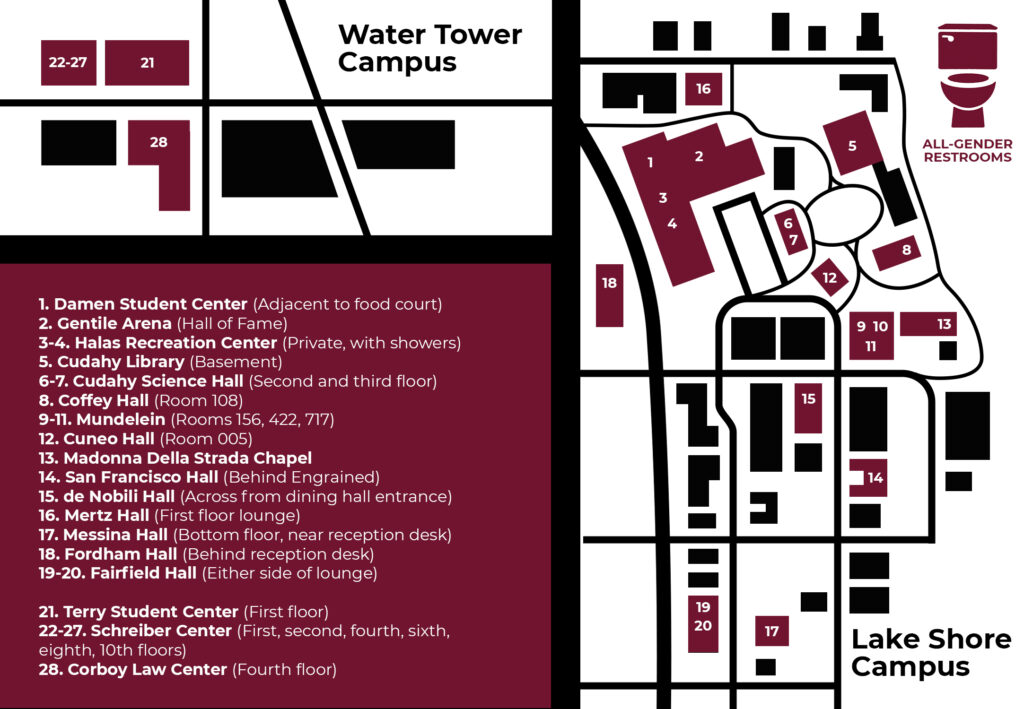Loyola has increased the number of gender-neutral bathrooms from 11 in 2019, to 28 in 2022, The Phoenix reported. Even though this is an increase, students are still pushing for better quality bathrooms, as well as more of them around campus.
Number of Gender-Neutral Bathrooms on Campus Up to 28
Loyola has increased the number of gender-neutral bathrooms from 11 in 2019, according to The Phoenix, to 28 in 2022 according to Matt McDermott, associate director of external Communications. Even though this is an increase, students are still pushing for better quality bathrooms, as well as more of them around campus.
Loyola currently houses 28 single-stall gender-neutral bathrooms between both campuses with 20 on Lake Shore Campus (LSC) and nine at Water Tower Campus (WTC) — an increase from the 11 total gender-neutral bathrooms in 2019. Some students are still displeased with the university’s progress. Aisha Mounir, a junior biology major said these bathrooms benefit all students, while hurting no one.
“There should be at least one gender-neutral bathroom in every building.” Mounir, 20, said. “If you are not comfortable using the gendered bathrooms you should still have the right to use the bathroom and feel supported doing it, because everyone else has that right.”
McDermott said there are only gender-neutral bathrooms in select buildings because of the time and cost it would take to renovate and put new pipes in.
“Until such time that a renovation project allows us to redesign floor plans to create spaces for gender neutral bathrooms, these buildings will not be able to easily have space carved out near existing plumbing infrastructure to create new gender neutral bathrooms,” McDermott wrote.

McDermott explained why Loyola is building more gender-neutral bathrooms around campus in new buildings.
“In conjunction with Catholic teachings on human dignity we find it important to provide safe spaces to meet basic human needs in order to support accessibility, belonging, and engagement within our community,” McDermott wrote.
Grace Kolb, a first-year majoring in environmental engineering, and Lucie Pitt, a first-year environmental policy major have both expressed concern over the amount of bathrooms and the locations of these bathrooms.
“It’s a good start to being gender inclusive,” Kolb, 18, said. “They make people feel comfortable being themselves, but they need to do more, especially in Halas where there are only gendered locker rooms.”
Kolb goes on to say that even though they use the bathroom frequently, they are still difficult to find.
Pitt, a freshman majoring in environmental policy said even though they are non-binary, finding a bathroom is still hard. They also said sometimes these bathrooms can be an inconvenience.
“The bathrooms are fairly clean,” Pitt, 18, said. “I just wish there were multiple stalls in the bathrooms, it’s very inconvenient to just have one, which forces students to wait or find another bathroom, which both makes students late for class.”
Ryan Bradley, the president of Loyola University’s Rainbow Connection branch, expressed support for these bathrooms in a text sent to The Phoenix.
“We greatly support any initiatives to improve access to safe and clean restrooms for all individuals, regardless of gender presentation,” Bradley wrote.
Bradley also expressed disappointment about the quality and size of these bathrooms.
“I don’t think these bathrooms are enough for gender non-comfirming and trans students,” Bradley said. “They are usually single-stalled, and not in every building or every floor. I consistently used the gender-neutral bathrooms on the first floor of the Cudahy building and for the entire year there was no soap dispenser at all.”
Bethany Valante, the Public relations officer for the Loyola Rainbow Connection branch, wrote to The Phoenix in an email saying that the gender-neutral bathrooms are usually low on period products. The products are provided by the Students for Reproductive Rights group on campus, but the task of stocking them is now the University’s job, The Phoenix previously reported.
“This discrepancy is extremely harmful for trans folks who need supplies,” Valante wrote. “Loyola must do better to fulfill its mission for caring for all students, including trans and gender non-confirming students’.”
Matt McDermott said in an email to The Phoenix that Loyola is always striving for more equality and comfort in the LGBTQ+ community.
“There will always be an opportunity to do better and more, especially for our community members that hold marginalized identities,” McDermott wrote. “Facilities are committed to including gender neutral bathrooms in all new construction and major renovation projects.”
Topics
Get the Loyola Phoenix newsletter straight to your inbox!



